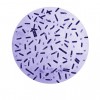 Clostridium botulinum is ubiquitous in nature, often found in soil and water. The bacteria and spores alone do not cause disease, but they produce the botulinum toxin that causes botulism, a serious paralytic condition that can lead to death. Although it is one of the least common of the foodborne diseases, anyone is susceptible even with the ingestion of only a small amount of toxin present in contaminated food. Immunocompromised individuals, young children, and elderly individuals may suffer from more serious symptoms. This 6-page fact sheet was written by Keith R. Schneider, Rachael Silverberg, Alexandra Chang and Renée Goodrich Schneider, and published by the UF Department of Food Science and Human Nutrition, December 2014.
Clostridium botulinum is ubiquitous in nature, often found in soil and water. The bacteria and spores alone do not cause disease, but they produce the botulinum toxin that causes botulism, a serious paralytic condition that can lead to death. Although it is one of the least common of the foodborne diseases, anyone is susceptible even with the ingestion of only a small amount of toxin present in contaminated food. Immunocompromised individuals, young children, and elderly individuals may suffer from more serious symptoms. This 6-page fact sheet was written by Keith R. Schneider, Rachael Silverberg, Alexandra Chang and Renée Goodrich Schneider, and published by the UF Department of Food Science and Human Nutrition, December 2014.
http://edis.ifas.ufl.edu/fs104